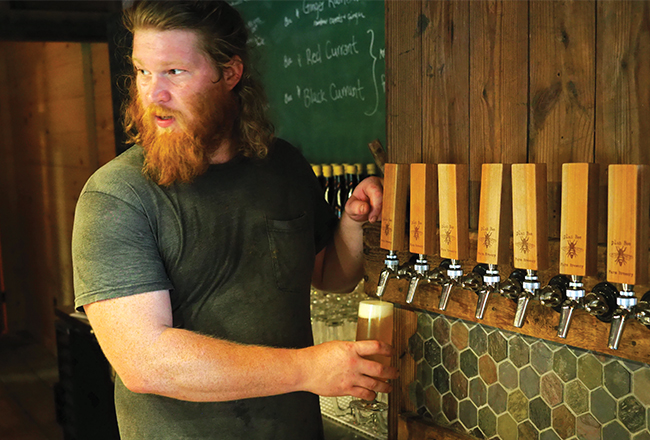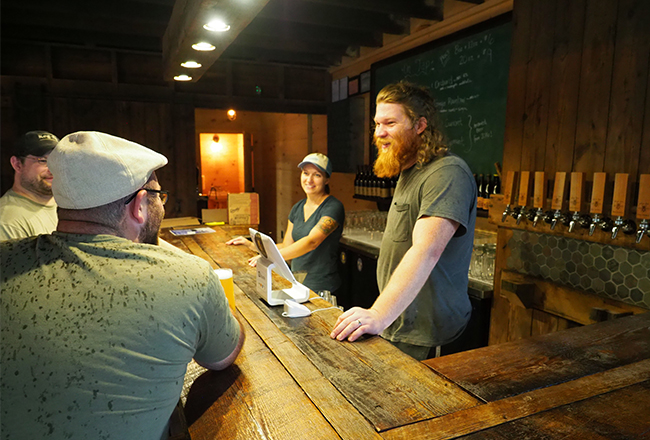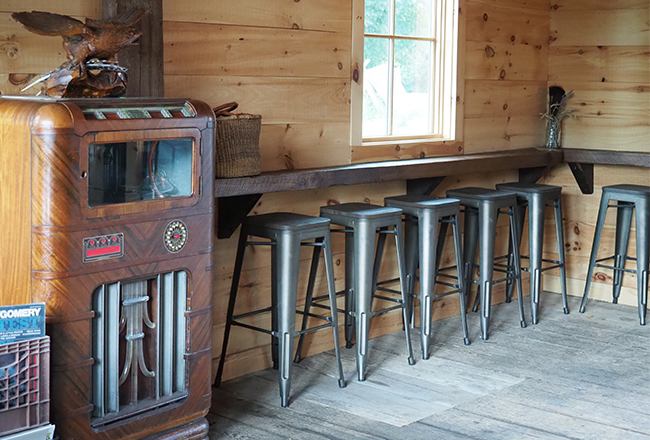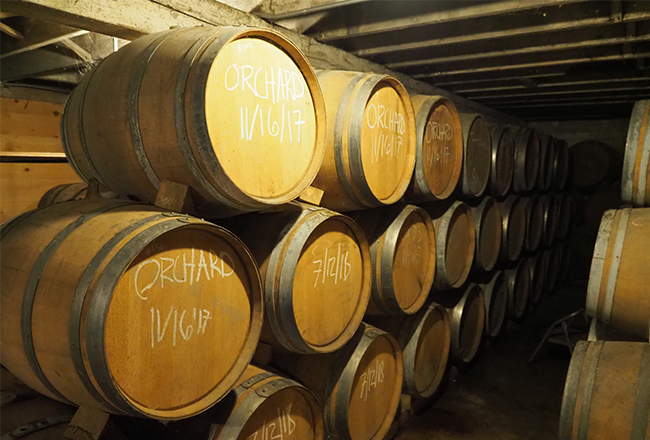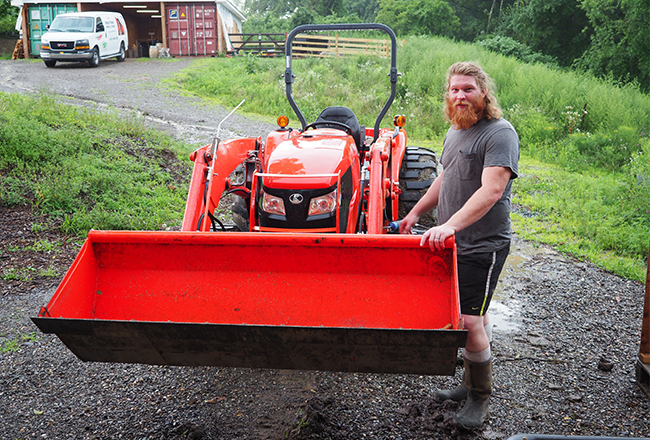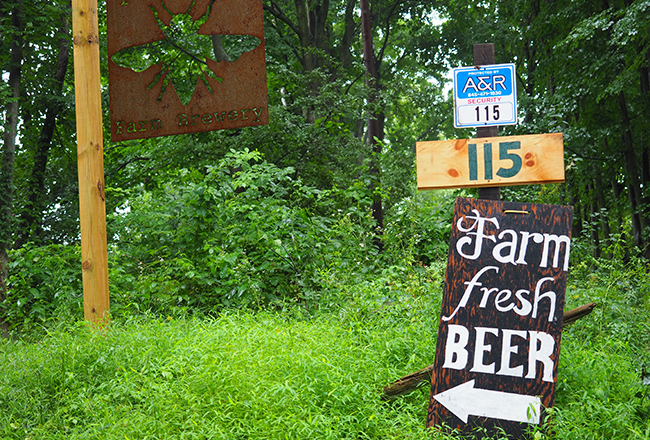Follow Underhill Road off Innis Avenue in the town of Poughkeepsie long enough and the pavement eventually gives way to dirt. Keep going, and you”™ll see the sign: “Farm Fresh Beer.”
If it”™s a weekend, you can travel past rows of corn, possibly a wandering chicken, and find Evan and Emily Watson, the husband-wife team behind Plan Bee Farm Brewery, which has been selling beer made solely from New York ingredients since 2013.
In that time, the brewery has made a name for itself, serving mostly wild and sour farmhouse ales that start from a yeast made with honey harvested on the property.
The Business Journal visited the Plan Bee farm 24 hours before the grand opening of the brewery”™s new tasting room ”” a painstakingly restored 1830s wooden barn with a bar, a 10-barrel brewing house and a subterranean cooling cellar that houses barrels for aging beers.
Over the brewery”™s signature Barn Beer ”” a wild ale that”™s part tart, part funky ”” Evan tells the story that took him from a career in music to brewing beer in the Hudson Valley.
Watson, originally from Indiana, arrived with Emily to New York City in 2008 to pursue a career as a musician. He played festivals such as Bonnaroo, wrote songs for Meatloaf and toured with Def Leppard. On the side, he and Emily were also home brewing.
Evan got his first professional brew training from Captain Lawrence Brewing Co. in Elmsford. He was playing the Pleasantville Music Festival in 2009 when he met with a couple brewery staffers, which at the time was operating in Pleasantville.
“They approached and said ”˜We really like your music,”™” Watson recalled. “I said, ”˜Well, I really like your beer.”™”
He was invited to help out in Captain Lawrence”™s tasting room and got to learn the ins and outs of brewing. By 2011, he described feeling more satisfied with the beer than the music.
“In music, you can work really hard and feel like you”™re getting better and better, but then there”™s no immediate gratification,” Watson said. “Whereas something like brewing, it”™s tactile. I was starting to do more on the physical side of brewing with Captain Lawrence and found whatever I put into it, I got something back.”
He and Emily decided to launch a brewery of their own. The pair both had Midwest farming roots ”” Emily grew up on a farm in Ohio ”” so Evan said they knew using farm ingredients would be crucial to the business.
He wanted to put the emphasis on local in local beer.
“We were using malts from England, hops from out west, or Germany, and calling it a local beer,” Evan said. “You couldn”™t do that with food. I thought, what would it be like to brew beer using only local ingredients?”
Conveniently, lawmakers in Albany at the time wanted to make it easier for brewers to do just that. In 2012, the state passed the Farm Brewery Law, creating a new license for craft brewers that use ingredients grown in state.
Plan Bee Farm Brewery opened under the license in 2013, one of the first breweries to do so. From a small 1-acre farm property in Fishkill, the brewery was able to produce about 30 gallons of beer a batch from a small shed on the site. The beer developed a following that the brewery”™s capacity struggled to keep up with.
Plan Bee landed at the 25-acre farm in Poughkeepsie in 2015, after a friend approached them interested in investing in the brewery”™s expansion. Evan and Emily looked at several farms before another friend approached them with the property in Poughkeepsie.
While farming on the property dates back to the 19th century, the land had spent years dormant and overgrown and abandoned.
“It was a mess,” Watson said. “There were structures all over, the façade of the barn had fallen in.”
The past three years have been spent restoring the property ”” marked most recently by the official grand opening of the tasting room in the almost 200-year-old barn.
The Watsons have also restored farm functions on the property, adding corn, buckwheat, honeybees, chickens and goats.
For now, a farm license only requires breweries source 20 percent of their hops and other ingredients from New York sources (the percentage goes up to 60 percent in 2019 and 90 percent in 2024). But Plan Bee has sourced 100 percent local from its start.
“Everything was New York ingredients, even when that was nearly impossible,” Watson said. “Now, it”™s very possible.”
The acreage of hops grown in New York has nearly doubled from 2014 to 2016, and the acreage of malting barley has increased over the same period from 422 acres to approximately 2,000 acres, according to data from Cornell University. Earlier this spring, Gov. Andrew M. Cuomo attributed that growth to the more than 200 licensed farm breweries now operating in the state.
“We”™re at a point where I think ingredient quality is on par and the prices have gone down, it”™s creating an economy,” Watson said, something he said would have seemed impossible five years ago.
Plan Bee”™s website exhaustively details the New York sources that go into its beer: hops from LaGrangeville, malt from Germantown and specialty grains from Hudson. The beer is aged in barrels from Hillrock Distillery in Columbia County and Prospero Winery in Pleasantville. Even the labels are printed at Poughkeepsie”™s Main Printing.
The farm provides ingredients as well. Along with the honey that makes the yeast for the beer, the Watsons have planted hops and have a wild apple orchard.
The tasting room features beers on tap, along with a cask ale, as well as bottles available in store. Plan Bee”™s wild and sour ales are also distributed through the Hudson Valley and New York City, along with parts of Pennsylvania and Massachusetts.
Watson said he was more excited than nervous for the tasting room”™s grand opening. He still has plans for the property. He said he”™s thought of carving trails through its 25 acres, perhaps adding other, small gathering places. The Watsons are also working to make the brewery 100 percent sustainable, such as by signing up for community solar to offset electric use on the farm.
“This is a big thing to get to sell beer out of here, it”™s so amazing after what this place was three years ago,” Watson said. “But I still have ideas. There”™s a lot of projects before it”™s done ”” I don”™t know if that will ever happen.”





